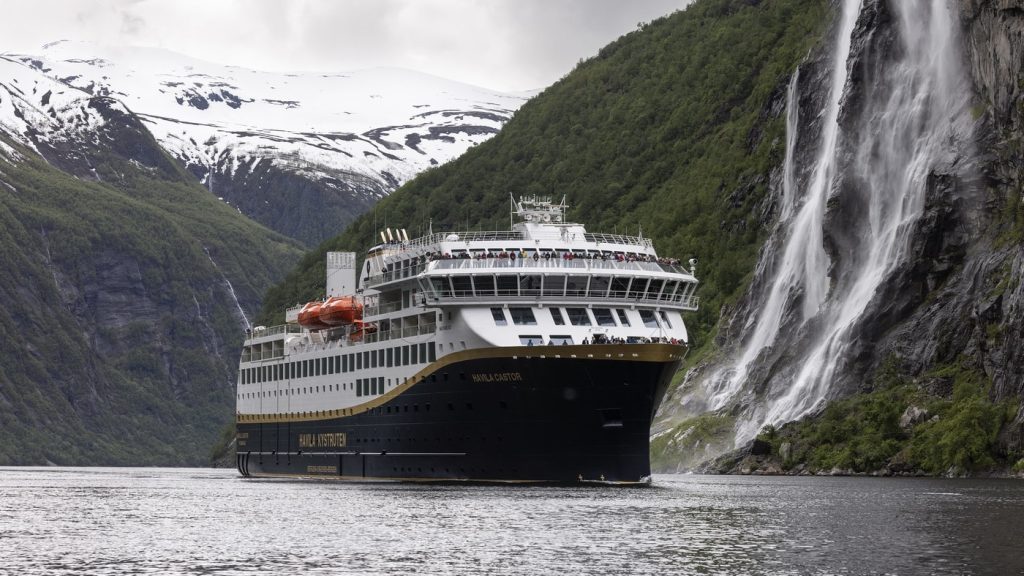
Built for the future, the Havila Kystruten ships are the most environmentally friendly ships along the Norwegian coast. With a 6.1 megawatt-hour battery pack, the world’s largest battery pack on a passenger ship, ships can sail for up to four hours on battery power alone.
Combined with liquefied natural gas (LNG), CO2 emissions are reduced by 30 percent and NOx emissions by 90 percent compared to similar fossil fuel-powered vessels.
As the summer season begins, Geirangerfjord is open for cruises and ferries. In 2018, the Norwegian Parliament decided that cruise ships and ferries should operate zero-emissions in the Norwegian fjords at the World Heritage site as quickly as technically possible, but no later than 2026. On Thursday, Havela Kastor made its first zero-emissions voyage at Geirangerfjord.

“Even the weather was on our side yesterday. This was a milestone for us. We’ve demonstrated our ability to meet future regulatory requirements,” said Bent Martini, CEO of Havila Kystruten. “We used just over 60 percent of the battery capacity in these flight, and this shows us that the goal of four hours of battery operation is clearly achievable. With more testing and modifications to the total power consumption on board, we will eventually be able to navigate the entire UNESCO World Heritage Site without any major challenges,”
In order to be able to use the batteries on board more than before, Martini calls for access to shore energy along the coast. “We want to continue to use our battery power, but to do so we rely on having the coastal energy infrastructure in place to charge the ship with clean hydroelectric power. We hope this will be operational in select ports of call soon. Additionally, we plan to gradually add LPG to replace natural gas over time. .Biogas must be available in sufficient quantities to cover our needs,” says Martini.
The Zero Environmental Foundation was also on board during the historic voyage.
“This voyage is a milestone, the culmination of many years of work. Havila Kystruten has shown that now, four years before the requirements set by Parliament, it is entirely possible to navigate the UNESCO World Heritage fjords without emissions. This should motivate other players to to follow suit,” says Harald Malland, ZERO traffic consultant.
“Now we have to ensure more progress: the parliamentary decision from 2018 must be settled as quickly as possible and the zero emissions requirement extended to all fjords. Port shipping infrastructure must also be in place.”

Trols Bruland was standing on the bridge when Havila Castor entered Geirangerfjord for the first time, and as captain of the ship he was clearly proud: “We have a modern ship that behaves like a dream at sea,” Bruland says happily. “And of course it is also great to be able to contribute to the protection of the environment on the Norwegian coast through our sustainable path.”
For a ship like the Havila Castor to function as well as possible, Bruland and his crew on the bridge rely on good cooperation with the engine room, for which Chief Engineer Allan William Johansen is responsible.
“It was an exciting, full of, and special day for us. When we experience the ship like today, there is a lot to do, and last but not least, it is important that the entire ship optimize its energy consumption so that we use as much energy as possible for propulsion,” says Johansen. “We had good experiences today, so next time we can sail more efficiently and emission-free.”

Before switching to battery operation, passengers on board were aware of the energy consumption for charging portable devices, lighting and heating in the cabin as well as operating the ship’s hotel reducing energy consumption.
“It takes some resources to cook for more than 300 passengers, as well as lighting and heating on board the ship. When we sail without emissions, we do everything we can to reduce electricity consumption and so sailing becomes a shared responsibility,” says Sandra Ness, Head of Climate and Environment at Havela Kestroten.
With the start of this voyage, Havila Kystruten launched its new Eco-Voyager program for guests on board. “If we want to be successful in the areas of climate, environment and sustainability, it is important that we also get our guests on board,” says Ness.
The program aims to give our guests the opportunity to participate on board and make informed choices, thus contributing to a more sustainable use of human and material resources. We want to inspire and encourage our guests to take small steps while cruising around the coast that positively impact daily life on board in terms of energy, water, waste, cleaning and therefore the crew as well,” explains Ness.
havilavoyages.com

“Total coffee aficionado. Travel buff. Music ninja. Bacon nerd. Beeraholic.”








More Stories
Wealthy families take more risks when it comes to money.
Salesforce and NVIDIA Form Strategic Collaboration to Drive AI Customer Innovation
Changing banks causes problems for customers